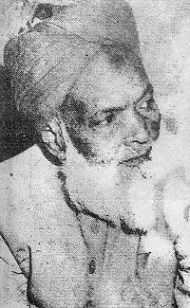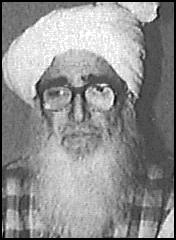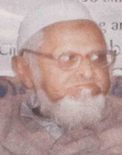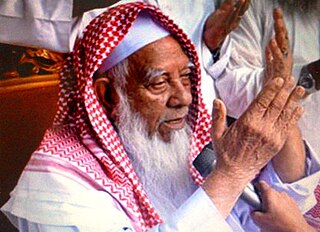
Deobandi is a revivalist movement within Sunni Islam, adhering to the Hanafi school of law, formed in the late 19th century around the Darul Uloom Madrassa in Deoband, India, from which the name derives, by Muhammad Qasim Nanautavi, Rashid Ahmad Gangohi, and several others, after the Indian Rebellion of 1857–58. The movement pioneered education in religious sciences through the Dars-i-Nizami associated with the Lucknow-based ulema of Firangi Mahal with the goal of preserving Islamic teachings under colonial rule. The Deobandi movement's political wing, Jamiat Ulema-e-Hind, was founded in 1919 and played a major role in the Indian independence movement through its propagation of the doctrine of composite nationalism.

The Darul Uloom Deoband is an Islamic seminary in India at which the Sunni Deobandi Islamic movement began. It is located in Deoband, a town in Saharanpur district, Uttar Pradesh. The seminary was established by Muhammad Qasim Nanautavi, Fazlur Rahman Usmani, Sayyid Muhammad Abid and others in 1866. Mahmud Deobandi was the first teacher and Mahmud Hasan Deobandi was the first student.
Darul uloom, also spelled dar-ul-ulum, is an Arabic term that literally means "house of knowledge". The term generally means an Islamic seminary or educational institution – similar to or often the same as a madrassa or Islamic school – although a darul uloom often indicates a more advanced level of study. In a darul uloom, Islamic subjects are studied by students, who are known as talaba or ṭālib.

Muhammad Taqi Usmani is a Pakistani Islamic scholar and former judge who is the current president of the Wifaq ul Madaris Al-Arabia and the vice president and Hadith professor of the Darul Uloom Karachi. An intellectual leader of the Deobandi movement, he has authored 143 books in Urdu, Arabic and English, including a translation of the Qur'an in both English and Urdu as well a 6-volume commentary on the Sahih Muslim in Arabic, Takmilat Fath al-Mulhim and Uloomu-l-Quran. He has written and lectured extensively on hadith, and Islamic finance. He chairs the Shariah Board of the Bahrain-based Accounting and Auditing Organization for Islamic Financial Institutions (AAOIFI). He is also a permanent member of the Jeddah-based International Islamic Fiqh Academy, an organ of the OIC.

Darul Uloom Karachi is a Madrasa in Karachi, Pakistan. It was founded by Muhammad Shafi Deobandi on June 1951 at Nanak Wara and later on it transferred to Korangi, Karachi, on March 17, 1957. It continues the tradition of the Darul uloom system initiated by Darul Uloom Deoband. The institution has adopted a balanced approach between religious and worldly matters. The secondary schools have individual faculties for both boys and girls. The school has the highest standards of Islamic education and offers a combined curriculum covering traditional Islamic studies and contemporary academic subjects. It is registered as one of the Islamic Schools under Wifaq ul Madaris Al-Arabia.
Ashraf Ali Thanwi was a late-nineteenth and twentieth-century Sunni scholar, jurist, thinker, reformist and the revival of classical sufi thought from Indian subcontinent during the British Raj, one of the chief proponent of Pakistan Movement. He was a central figure of Islamic spiritual, intellectual and religious life in South Asia and continues to be highly influential today. As a prolific author, he completed over a thousand works including Bayan Ul Quran and Bahishti Zewar. He graduated from Darul Uloom Deoband in 1883 and moved to Kanpur, then Thana Bhawan to direct the Khanqah-i-Imdadiyah, where he resided until the end of his life. His training in Quran, Hadith, Fiqh studies qualified him to become a leading Sunni authority among the scholars of Deoband. His teaching mixes Sunni orthodoxy, Islamic elements of belief and the patriarchal structure of the society. He offers a sketch of a Muslim community that is collective, patriarchal, hierarchical and compassion-based.

Muḥammad Shafī‘ ibn Muḥammad Yāsīn ‘Us̱mānī Deobandī, often referred to as Mufti Muhammad Shafi, was a Pakistani Sunni Islamic scholar of the Deobandi school of Islamic thought.

Abdul Haq of Akora Khattak, Pakistan, sometimes referred to as Abdul Haq Akorwi was a Pashtun Islamic scholar and the founder, chancellor, and Shaykh al-Hadith of the Islamic seminary Darul Uloom Haqqania. He has also served as vice-president of Wifaq ul Madaris Al-Arabia, Pakistan. He was involved in politics as a member of the political party Jamiat Ulema-e-Islam. He served three times in the National Assembly of Pakistan and was an active proponent of the Khatme Nabuwwat movement.
Mahmood Hasan Gangohi (1907–1996) was an Indian Mufti and Islamic scholar and former Grand Mufti of Darul Uloom Deoband and Mazahir Uloom, Saharanpur. He was the most senior disciple of Muhammad Zakariyya al-Kandhlawi.
Mujahidul Islam Qasmi was an Indian Mufti, Qadhi and Islamic scholar, founder of Islamic Fiqh Academy. He served as the President of All India Muslim Personal Law Board.
Muhammad Salim Qasmi Siddiqi was an Indian Muslim scholar who co-founded the Darul Uloom Waqf in Deoband and served as its first rector. He was an alumnus of Darul Uloom Deoband. He received the fourth Shah Waliullah Award and was honoured with the Mark of Distinction from Egypt.
Muhammad Taqi Amīni was an Indian Sunni Islamic scholar, jurist, Urdu author and the dean of Theology faculty of Aligarh Muslim University. He is known for his works on Islamic jurisprudence, and his book Fiqh Islami ka Tareekhi Pas-e-Manzar is a required reading for master's degree in Islamic studies at the Islamic University of Science & Technology.
Saeed Ahmad Palanpuri, was an Indian Sunni Muslim scholar and author who served as Shaykh al-Hadith and Principal of Darul Uloom Deoband. A number of his books are required readings in Darul Uloom Deoband.

Aziz-ul-Rahman Usmani was an Indian Sunni Muslim scholar who served as first Grand Mufti of Darul Uloom Deoband. He is best known for his Fatawa Darul Uloom Deoband. His brother was Shabbir Ahmad Usmani.

Zafeeruddin Miftāhi was an Indian Muslim scholar and jurist who served as a Mufti of Darul Uloom Deoband and the second president of Islamic Fiqh Academy. He compiled the religious verdicts of Azizur Rahman Usmani, called the Fatāwa Darul Uloom Deoband in twelve volumes and wrote books including Islām Ka Nizām-e-Masājid, Islām Ka Nizām Iffat-o-Asmat and Tārīkh-e-Masājid.
The Fatwas for cash scandal was a bribery scandal that erupted in some prominent Islamic institutions in India in September 2006 when a TV channel broadcast a Sting operation which showed a number of clerics indulging in or demanding bribery in return for issuing fatwas. The institutions involved included Darul Uloom Deoband, Islamic Fiqh Academy, Madrasa Aminia, Madrasa Khadimul Islam Hapur, Madrasa Mahmudiya Meerut and others.

This bibliography of Deobandi Movement is a selected list of generally available scholarly resources related to Deobandi Movement, a revivalist movement within Sunni Islam, adhering to the Hanafi school of law, formed in the late 19th century around the Darul Uloom Deoband in British India, from which the name derives, by Muhammad Qasim Nanautavi, Rashid Ahmad Gangohi and several others, after the Indian Rebellion of 1857–58. It is one of the most influential reform movements in modern Islam. Islamic Revival in British India: Deoband, 1860-1900 by Barbara D. Metcalf was the first major monograph specifically devoted to the institutional and intellectual history of this movement. Muhammad Tayyib Qasmi wrote a book named The Tradition of the Scholars of Deoband: Maslak Ulama-i-Deoband, a primary source on the contours of Deobandi ideology. In this work, he tried to project Deoband as an ideology of moderation that is a composite of various knowledge traditions in Islam. This list will include Books and theses written on Deobandi Movement and articles published about this movement in various journals, newspapers, encyclopedias, seminars, websites etc. in APA style. Only bibliography related to Deobandi Movement will be included here, for Darul Uloom Deoband see Bibliography of Darul Uloom Deoband.

This bibliography of Darul Uloom Deoband is a selected list of generally available scholarly resources related to Darul Uloom Deoband, a leading Islamic seminary and Muslim theological centre in India at which the Deobandi movement began, founded in 1866. It is one of the most influential reform movements in modern Islam. It boasts the largest network of satellite madrasas all over the world especially India, Bangladesh, Pakistan, Afghanistan neighboring countries in Asia and beyond, and as far afield as the Caribbean, South Africa, United Kingdom and the United States. Islamic Revival in British India: Deoband, 1860-1900 by Barbara D. Metcalf was the first major monograph specifically devoted to the institutional and intellectual history of Deoband. Syed Mehboob Rizwi wrote History of Darul Uloom Deoband in 1977 in 2 volumes. This list will include Books and theses written on Darul Uloom Deoband and articles published about Deoband in various journals, newspapers, encyclopedias, seminars, websites etc. in APA style. Only bibliography related to Darul Uloom Deoband will be included here, for Deobandi movement see Bibliography of Deobandi Movement.

Darulifta-Deoband.com is a bilingual fatwa website maintained by the Online Fatwa Department of Darul Uloom Deoband. As of 2016, it is the world's largest bilingual fatwa website. About 15,000 fatwas are sought in Darul Uloom Deoband every year, of which 6 to 7 thousand are online. In January 2022, India's National Commission for Protection of Child Rights recommended the government to shut down the website, citing its content as violating the country's laws.
Darul Uloom Newcastle is a college for Higher Islamic Education, located in Newcastle, KwaZulu-Natal, South Africa. It was the first formal institution of higher Islamic studies in South Africa, as well as the first Deobandi madrasa in South Africa. It was founded by Cassim Sema in 1973. It is called the mother of all Darul Ulooms in South Africa. Although only Hanafi fiqh is taught in such institutions in the Indian subcontinent, it also offers both Hanafi and Shafi'i fiqh.











